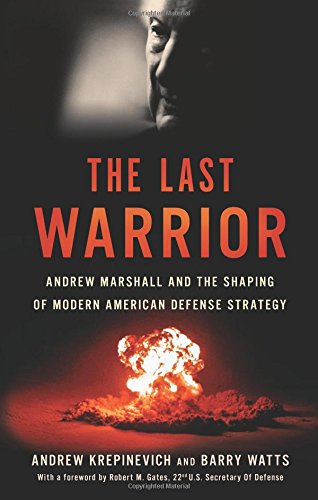
The Last Warrior
Andrew Marshall and the Shaping of Modern American Defense Strategy
- اطلاعات
- نقد و بررسی
- دیدگاه کاربران
نقد و بررسی

January 26, 2015
For four decades Andrew Marshall has been a central figure of the U.S. security establishment, particularly in his role as director of the Office of Net Assessment where he has mentored the intellectual dimension of a historically-pragmatic military system. Krepinevich and Watts, major contributors to contemporary security studies, have produced an objective and perceptive intellectual history of Marshall and his work. Marshall joined the embryonic Rand Corporation in 1949, formulating the concept of ânet assessmentâ in a Cold War context. This process systematically compares the U.S. military position to its rivals and friends with the aim of enabling long-range planning as opposed to immediate problem-solving. Now standard procedure, its controversial introduction challenged and cultivated both Marshallâs political skill and his analytic power. Marshall made crucial contributions to the Reagan administrationâs policies and later applied the methods of net assessment to the wider issue of responding to fundamental changes in the nature of warâthe resultant controversies of which continue to inform the thinking of armed forces and defense intellectuals. The authors demonstrate how Marshallâs ability to ask the right questions and see clearly into uncertain futures has been vital to Americaâs ability to keep pace with warâs fundamentally protean nature. Agent: Eric Lupfer, William Morris Endeavor.

November 1, 2014
A well-organized biography of Andrew Marshall (b. 1921), the architect of the Defense Department's "net assessment" strategy since the early days of the Cold War.Two leading members of the Center for Strategic and Budgetary Assessments, Krepinevich (7 Deadly Scenarios: A Military Futurist Explores War in the 21st Century, 2009, etc.) and Watts have both served in Marshall's Office of Net Assessment at the Pentagon during the last few decades. Marshall took the ONA helm in 1973. During the Cold War, the task of the agency was to create careful comparisons of U.S.-Soviet weapons systems and costs so that the U.S. could implement a workable framework aimed at gaining advantage. Following the end of the Cold War, the ONA has shifted its focus to China and elsewhere. Since Marshall's first 1972 memo, "The Nature and Scope of Net Assessments"-issued when he had only recently left RAND after 20-plus years at the request of then-National Security Adviser Henry Kissinger-Marshall's assessments have remained classified, yet the framework he set out has stood the test of time. Part of the puzzling information Marshall then signaled was the huge discrepancy between what the U.S. spent on weaponry versus what the Soviets did. At the time, the Pentagon regularly overestimated the size of the Soviet economy and underestimated the amount of military spending from that economy; Marshall's assessments hinted at the severe structural problems caused by the Soviet defense burden. Nonetheless, the hysterical competition with the Soviets prompted President Ronald Reagan to ramp up military spending to unprecedented levels. In clear prose (despite the plethora of acronyms, eased by the glossary at the end), the authors trace the career of this brilliant strategic thinker, from his working-class Detroit upbringing to becoming a largely self-taught statistician to working with the big-name government wonks over numerous administrations. An elucidating intellectual history of an influential strategic sage that few outsiders have ever heard of.
COPYRIGHT(2014) Kirkus Reviews, ALL RIGHTS RESERVED.

December 1, 2014
For seven decades, Andrew Marshall (b. 1921) has been one of the nation's most influential national security advisors, mostly as director of the Department of Defense's Office of Net Assessment, claim Krepinevich (president, Ctr. for Strategic and Budgetary Assessments (CSBA); Deadly Scenarios) and Watts (senior fellow, CSBA) in this detailed, rigorous account of Marshall's career at RAND Corporation and the Department of Defense. Both authors admire Marshall, having been mentored by him at what his former students call "St. Andrew's Prep," and pay tribute to his long and distinguished career by calling him "the last warrior" of the Cold War era. The intricacies of net assessment, which offer options but not recommendations for strategic defense policymakers, are skillfully unraveled. Marshall's most important evaluations, conclude the authors, revealed that the USSR's military expenditures were bankrupting the government and contributed significantly to its fall and his accurate prediction that China would become a superpower that could pose security challenges for the United States. Marshall is praised for his fearlessness in confronting self-serving Pentagon officials who put their own careers ahead of national concerns. VERDICT Excessive detail and some rambling descriptions will discourage a general audience. However, informed readers of foreign policy and specialists will find the authors' research impressive and Marshall's story enlightening.--Karl Helicher, Upper Merion Twp. Lib., King of Prussia, PA
Copyright 2014 Library Journal, LLC Used with permission.




دیدگاه کاربران